|
|
|
Sort Order |
|
|
|
Items / Page
|
|
|
|
|
|
|
| Srl | Item |
| 1 |
ID:
133602
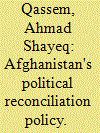

|
|
|
|
|
| Publication |
2014.
|
| Summary/Abstract |
The Afghan government's peace and reconciliation overtures to the militants, initially at the unofficial level but later sanctioned officially, have formed a key theme of state security policy from the early days of the post-Taliban administration in Afghanistan. Yet far from producing peace and stability, they seem to have played into the hands of the violent groups intent on overthrowing the country's internationally supported and legitimate political system in the past decade. There is no doubt about the importance of national reconciliation as a wider process of overcoming the legacy of beleaguered social relationships and forging a common vision for the future among all Afghans, but the nature of the government's reconciliation policy, which borders on appeasement of the militants, seems so far to have created more vulnerabilities than strengths in the face of increasingly emboldened anti-state violent groups.
|
|
|
|
|
|
|
|
|
|
|
|
|
|
|
|
| 2 |
ID:
118735
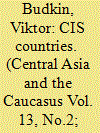

|
|
|
|
|
| Publication |
2012.
|
| Summary/Abstract |
December 1991 marked the beginning of a grandiose experiment whose purpose was to establish a whole group of independent states in the territory of a world giant known as the U.S.S.R., which occupied one-sixth of the Earth. Their establishment was based on the negation of the previous Soviet model providing for the domination of one party, which had imposed a no-choice ideology on the society, and for the administrative command system of politics and economics.
|
|
|
|
|
|
|
|
|
|
|
|
|
|
|
|
| 3 |
ID:
130442
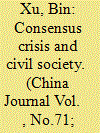

|
|
|
|
|
| Publication |
2014.
|
| Summary/Abstract |
Consensus crisis and civil society: the Sichuan earthquake response and state-society relations
A consensus crisis is characterized by challenges to the state's managerial capacity, a critical need for civil society's services, a general agreement on priorities and goals, and the state's efforts to construct a morally respectable image. These features amplify the structural conditions favorable for relatively amicable state-society interactions. Existing studies of social response to the 2008 Sichuan earthquake focus on state-society relations, but neglect the role of situations. I argue that the earthquake is an example of a consensus crisis, which provided civil associations with a situational opening of political opportunity.
|
|
|
|
|
|
|
|
|
|
|
|
|
|
|
|
| 4 |
ID:
139284
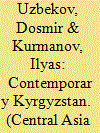

|
|
|
|
|
| Summary/Abstract |
The authors undertake the challenging task of going to the roots of the political instability that enveloped Kyrgyzstan during the period of democratic transit and discover that the bureaucratic state cannot adapt democratic values to the local conditions and, most importantly, does not want to do this. The political elite of Kyrgyzstan, which remains under the spell of Soviet political and spiritual legacy and which has been exhausted by two coups, demonstrates a very low level of cohesion and weakened political will. The authors describe the ways and means that will help the state and society remove the obstacles and remedy the shortcomings to finally acquire political stability and move forward.
|
|
|
|
|
|
|
|
|
|
|
|
|
|
|
|
| 5 |
ID:
133225
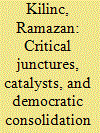

|
|
|
|
|
| Publication |
2014.
|
| Summary/Abstract |
IN FEBRUARY 1997, THE TURKISH MILITARY INTERVENED in politics to protect secularism from the "rising Islamist threat." This intervention resulted in the toppling of the coalition government led by the Islamic-oriented Welfare Party (RP, Refah Partisi). Many civil and political restrictions followed this intervention, including the closure of the RP by the Constitutional Court. Two years later, the Chief of Staff, Hüseyin K?vr?ko?lu, stated that "the 28 February process," by which he meant the military-sanctioned political configuration,would continue for one thousand years if necessary.1 However, by 2012, only 15 years after the intervention, the military's ability to shape politics has diminished notably. By any measure, the civilian oversight of the military is now at its highest level since the first military coup in modern Turkey in 1960.2 The Islamic-oriented Justice and Development Party (AK Party, Adalet ve Kalk?nma Partisi)3 stayed in power for more than a decade. Furthermore, Turkey implemented several democratic reforms that reversed the authoritarian movement of the period immediately after the 1997 military intervention. Additionally, the Parliament passed laws that liberalized the Press Law, Turkish Penal Code, the state policies toward religious minorities, rights for Kurdish minorities, and human rights regulations.4 Since Turkey transited to multi-party politics in 1945, it has experienced four military interventions (1960, 1971, 1980, and 1997); each time, the military built a political system that maintained its influence even after the transfer of power to civilian government. Given Turkey's long history with military tutelage, including its orchestrated effort to redesign Turkish politics in the late 1990s, these liberalizing reforms have been revolutionary for democratic consolidation. Therefore, it can be asked: How did Turkey recover and consolidate its democracy within such a short period?
|
|
|
|
|
|
|
|
|
|
|
|
|
|
|
|
| 6 |
ID:
132895
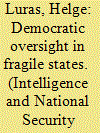

|
|
|
|
|
| Publication |
2014.
|
| Summary/Abstract |
In most transition countries the main aim of 'democratizing intelligence' is to weaken the authoritarian governmental structures by introducing more transparency, legality and oversight. In Bosnia and Herzegovina however, the state-building efforts driven by international parties combined formal democratization processes such as independent oversight with the strengthening and operational capacity building of previously weak-to-non-existent intelligence structures. In parallel with the descent into war when Yugoslavia collapsed in the early 1990s, the State Security Service (SDB) in the Republic of Bosnia had split into three ethnically-based outfits answering to the political and military leaders of war. 'Democratization' of intelligence in Bosnia and Herzegovina since the establishment of a unified, state-level Intelligence and Security Agency (OSA) in 2004 has followed its own unique path reflecting the fragmented nature of politics in Bosnia and the leading role of international organizations in proposing and effectuating institutional reforms. Nevertheless, in terms of habits, operational methods and values many Bosnian intelligence officers went through similar adaptations and transitions as their colleagues in countries where institutions at the time of democratic transition were too strong and authoritarian rather than, as in the case of Bosnia, being deemed too weak and ineffectual.
|
|
|
|
|
|
|
|
|
|
|
|
|
|
|
|
| 7 |
ID:
186571
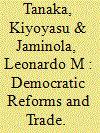

|
|
|
|
|
| Summary/Abstract |
The European Union (EU) re-instated the Generalized System of Preferences (GSP) for Myanmar from 2013 following the newly established “democratic” government in 2011. This paper highlights a series of democratic reforms in Myanmar as a key driver of the EU’s GSP re-instatement. We estimate the causal impact of duty-free access on Myanmar’s exports by exploiting the fact that the GSP re-instatement corresponded to a removal of Most-Favoured-Nation tariff rates in the EU market, which was plausibly exogenous for industries in Myanmar. The results show that the GSP re-instatement had a significantly large positive effect on Myanmar’s exports, with the most pronounced impact on the volume of garment exports. The EU’s GSP played a key role in linking democratic reforms to subsequent trade growth in Myanmar.
|
|
|
|
|
|
|
|
|
|
|
|
|
|
|
|
| 8 |
ID:
133118
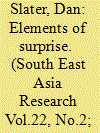

|
|
|
|
|
| Publication |
2014.
|
| Summary/Abstract |
If anything is more surprising than Burma's recent adoption of democratic reforms, it is that military rule lasted so long without such reforms in the first place. This article considers this paradox from both a country-specific and comparative-theoretical perspective, and argues that both perspectives are essential for analysing Burma's uncertain reform process as it unfolds or unravels. It portrays the top-down reform process as one of double-edged détente between the ruling Tatmadaw and its internal rivals as well as its external critics. This détente is inherently fragile because it rests on the current regime's confidence that democratization will produce neither serious instability nor even its own decisive defeat. Events that shake the Tatmadaw's 'victory confidence' and 'stability confidence' should thus pose the greatest risk that reforms will be stalled or reversed.
|
|
|
|
|
|
|
|
|
|
|
|
|
|
|
|
| 9 |
ID:
132529
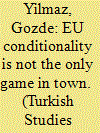

|
|
|
|
|
| Publication |
2014.
|
| Summary/Abstract |
Despite the weakened push by the European Union (EU) conditionality across time, Turkey's Europeanization process continues in a number of areas selectively. Focusing on such a puzzling trend, this article critically examines the role of EU conditionality on Turkey's Europeanization and unpacks domestic drivers of change. The article explores the impact of grassroots actors ?Turkish civil society organizations, business interest groups, media and political parties? on domestic change in the last decade and argues that continuing reforms in many areas in an era of limited EU-push are influenced by domestic actors.
|
|
|
|
|
|
|
|
|
|
|
|
|
|
|
|
| 10 |
ID:
137594
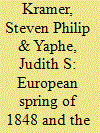

|
|
|
|
|
| Summary/Abstract |
The Arab Spring may be a historical turning point similar to the revolutions that swept Europe in 1848. The latter also began as a seemingly invincible wave demanding democratic reforms but turned into inglorious struggles with uncertain outcomes. They reshaped the map of Europe by replacing multinational empires with the relatively new concept of nationalism as the defining principle of governance. The Arab Spring of 2011 could do the same in the Middle East, where states are still defined according to the imperial principles laid out in World War I secret agreements. If 1848 proves anything, it is that the significance of great revolutionary upheavals emerges long after the barricades have been torn down. The year 1848 was not so much an end as a beginning; it is too early to tell how the Arab Spring will end.
|
|
|
|
|
|
|
|
|
|
|
|
|
|
|
|
| 11 |
ID:
133649


|
|
|
|
|
| Publication |
2014.
|
| Summary/Abstract |
Why do new EU democracies engage in multilateralism? The dominant explanation proposes that new democracies use international treaties to lock in domestic reforms. This article offers a novel explanation as to why new EU democracies participate in multilateral treaties. We argue that ratifying a treaty serves three external signaling purposes (recognition concerns, increasing strategic autonomy, and pleasing the European Union). We test our argument through a mix of quantitative and qualitative methods. First, we apply event history analysis. Drawing on a new ratification data set comprising 76 multilateral treaties, we illustrate the prominent role of new EU democracies in multilateralism as compared to other new democracies. Second, to assess the importance of external signaling in the decision to ratify multilateral treaties, we examine parliamentary ratification debates in selected Central and Eastern European countries. Third, we compare parliamentary discussions across European and non-European new democracies to demonstrate the different motives driving their approaches toward multilateralism.
|
|
|
|
|
|
|
|
|
|
|
|
|
|
|
|
| 12 |
ID:
113284
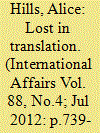

|
|
|
|
|
| Publication |
2012.
|
| Summary/Abstract |
The transfer of democratic values and practices such as community-based policing to African police forces is a key aspect of western aid and security policies, yet the cultural transmission on which it depends is not fully understood; the ways in which African officers respond to theories and practices imported from western societies has yet to be assessed critically. Further, despite decades of international support for police reform and re-education, there is little evidence to support the assumption that the skills, technologies and procedures associated with western policing can act as an effective channel for the transmission of democratic values. This article uses the Nigerian police's response to both externally funded and internally generated reform projects to address a question with implications for policy transfer more generally: what explains the uneven transmission of politically sensitive forms of knowledge? It discusses how imported ideas and practices are received by Nigerian officers and political elites, and how they are transformed having been filtered through local interests and dispositions. It shows that even when the process of reform is accepted, the political will required to ensure its effective implementation is not. Democratic practices do not travel well because recipients respond to imported practices in an adaptive manner, integrating aspects of donor understanding and indigenous realities.
|
|
|
|
|
|
|
|
|
|
|
|
|
|
|
|
| 13 |
ID:
091825
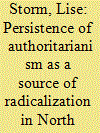

|
|
|
|
|
| Publication |
2009.
|
| Summary/Abstract |
September 11 and subsequent terrorist attacks across the globe have led to an increased emphasis on security issues among political leaders globally. While this preoccupation with security has not led to the abandonment of democracy promotion efforts, there is no doubt that initiatives that have the demise of authoritarianism as their core objective, have become less of a priority in recent years, with spending on projects seemingly unrelated to security issues and the 'war on terror' declining, and pressure on heads of state to embark on democratization processes weakening. This article contends that the relieving of pressure on heads of state to introduce democratic reforms is detrimental to the desired goal of increased security, given that the radicalization of Islamists is closely related to the prevalence of authoritarianism. In short, it is argued that there is reason to believe that the West's tendency to allow violations of basic democratic principles, and failing to employ genuine pressure for regime change in the various MENA states, which are actively partaking in the 'war on terror' on the side of the US, is counterproductive in the longer run. While it is impossible to predict when terrorism committed by radicalized Islamists will end, and it is almost certain that terrorist attacks will recur in the future and that we have to learn to live with the risks, it is possible however to do something about the scale and frequency of such incidents. This article argues that through positive democracy promotion resulting in real democratization, it is indeed possible to obtain increased security.
|
|
|
|
|
|
|
|
|
|
|
|
|
|
|
|
| 14 |
ID:
124158
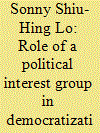

|
|
|
|
|
| Publication |
2013.
|
| Summary/Abstract |
The Hong Kong Alliance in Support of Patriotic Democratic Movements of China (HKASPDM) is a cross-border political interest group advocating for democratization in both mainland China and Hong Kong. It was involved in the bold rescue of mainland democrats out of the PRC shortly after the June 1989 Tiananmen crackdown; it constantly exerts pressure on the PRC government to release its political prisoners; it has been influencing the Hong Kong government on the scope and pace of democratization; it communicates with and subsidizes overseas Chinese groups supportive of democratic reforms in China; it is persistently educating the younger generations of Hong Kong and most importantly mainland visitors to Hong Kong on the 1989 Tiananmen tragedy; and its supporters have attempted to cross the border of Hong Kong to Macao to influence the policy of the Chinese government toward political prisoners. As a political interest group based in Hong Kong with cross-border influences on both the mainland and Macao, the Alliance has been making full use of the available political space and freedom of assembly in Hong Kong to achieve their ultimate objective of having a 'democratic China'. Its existence in the HKSAR is an indication of a certain degree of political tolerance by both the Hong Kong government and Beijing, which have to be very careful of the need to maintain an image of the feasible formula of 'one country, two systems' in Hong Kong.
|
|
|
|
|
|
|
|
|
|
|
|
|
|
|
|
| 15 |
ID:
129892
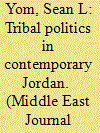

|
|
|
|
|
| Publication |
2014.
|
| Summary/Abstract |
During 2011/12, East Bank tribal youths in Jordan mobilized a new wave of political opposition through the Hirak movement. Reflecting generational change in their communities, as well as the historical erosion of tribal-state relations, these protest groups demanded sweeping democratic reforms from the monarchy. They also utilized language and methods more radical than the established legal opposition. This changing dynamic of tribal politics holds enormous implications for politics and stability within the Hashemite kingdom.
|
|
|
|
|
|
|
|
|
|
|
|
|
|
|
|
| 16 |
ID:
137381
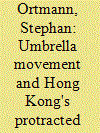

|
|
|
|
|
| Summary/Abstract |
The Umbrella Movement is the culmination of Hong Kong's protracted democratization process. This paper uses a historical perspective to explain the present situation. Students, which had been at the forefront of political activism in the 1970s, have yet again taken a leading role in the current movement. This has occurred as the democracy movement, which was buoyed by modest democratic reforms since the 1980s, has become deeply divided in recent years. Political parties of the pan-democratic camp, which played an important role in the 1990s, have been eclipsed by more assertive protest movements. The very slow progress of democratic reforms in Hong Kong is, however, due to the ruling elite. On the one hand, there is the authoritarian government in China which is worried about greater autonomy in its Special Administrative Region as well as potential spillover effects that could threaten one-party rule. At the same time, the powerful business elite in Hong Kong, Beijing's key ally, is worried that greater representative politics could lead to more substantial social redistribution.
|
|
|
|
|
|
|
|
|
|
|
|
|
|
|
|
|
|
|
|
|